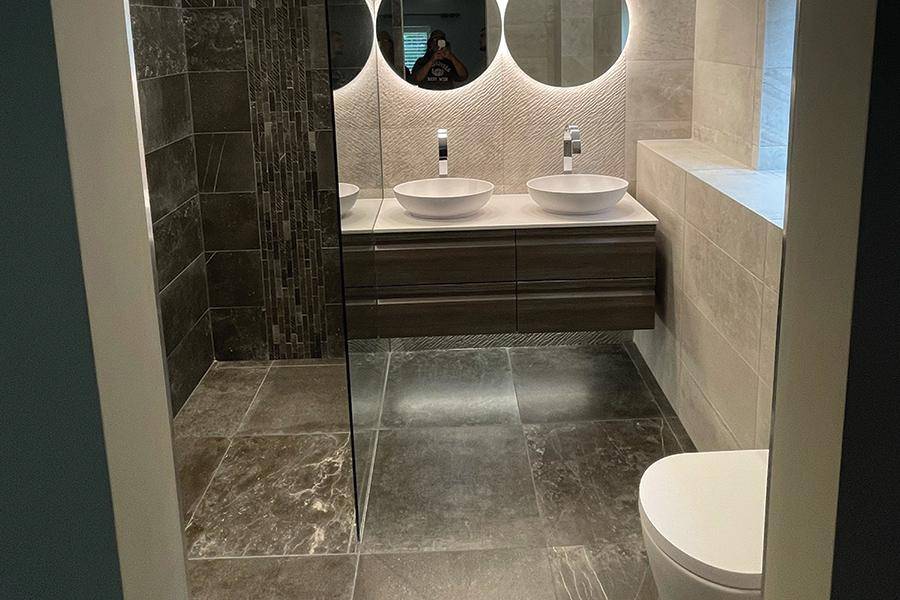Now long-established as a high-quality, bespoke wetroom installer, Sussex Wetrooms’ founder Adam initially took a rather unusual route into the tiling industry. This month, TSJ spoke with him to discuss this history, as well as some of the distinctive characteristics and challenges of wetroom installations.
“I was a career plumber since leaving school,” Adam begins, “and I always had a keen interest in bathrooms.” Throughout the early stages of his career, he would carry out plumbing and bathroom preparation on jobs himself, before contracting a tiler in to finish the walls and floors.
That all changed in 2012: “I had a rather nice barn conversion job, and unfortunately the tiler that we’d used for years – I don’t know if he’d had a bad month or something – but the job was atrocious. £4000 worth of marble basically needed ripping off the wall.” While Adam is careful to never belittle the work of another tradesperson, when this customer asked him back to review the job, he took one look at the tiling and knew it wasn’t up to standard.
“So I got in touch with my stone supplier. I reordered the entire bathroom’s worth of marble and then set about fixing it all myself. And I did a really good job.” This latent talent for tiling didn’t come out of nowhere, of course. Adam took time and care on the installation, but more importantly, he leant on experienced colleagues and contacts in the trade for advice, ultimately achieving a “stunning finish and, inevitably, a happy customer”.
At this point, Adam decided there was no need to subcontract out to another tiler – he could do it himself. Rather than just muddle through and develop skills as he went along though, he resolved to learn as much as he could about tiling as efficiently as possible. “I took a lot of tiling training courses, honing my skills to the point that I got a real passion for it and decided: I’m no longer going to be a plumber, I’m going to be a bathroom installer. And that’s what we’ve done since, design and fit bathrooms – doing the entirety of the job ourselves.”
Ever since
Back then, Adam worked with his oldest son, whereas now – after his eldest moved on in his career – he works with his youngest. Despite the increasing success the company has achieved since then, fielding many more enquiries than it could ever realistically keep up with, he’s never felt the need to expand the team beyond the father-and-son format. “After that experience I had with the subcontractor, it became oh-so-clear to me that: no one will ever care about your business as much as you do. And that’s the sole reason we’ve never expanded.”
With this rather specialist team and approach, Sussex Wetrooms can only take on select projects each year and generally books anything from eight months to a year in advance. “For me it’s about finding the right job,” Adam says. For example, he tries to work within 25 miles of the company’s home, Fairlight in East Sussex, although admittedly this isn’t always easy: “Obviously, since we’re right on the coast, we don’t have a radius – we can only go in one direction.” If historic customers ask specifically for work on their second homes, Adam is typically happy to oblige even if that takes him as far as London. “I generally don’t undertake 4 new work in the city, it’s usually only with existing contacts. But never say never!”
Naturally, the care and attention taken in the job selection process extends through every project Sussex Wetrooms undertakes. For Adam, everything, down to the specific products and suppliers, must be perfect. “We’re very specialist, we only install Schlüter products,” he explains. For some time, since his transition into tiling, Adam had been frustrated that no manufacturer seemed to offer a complete suite of products for wetrooms. “And that’s where I think Schlüter has nailed it, they literally have a solution for everything. For containing water and waterproofing, they have the answer.” At this point, having undertaken several training sessions with the company, Sussex Wetrooms has become a trusted installer for the manufacturer. If a client contacts Schlüter for a job in the area, the company will actively recommend Sussex Wetrooms for the installation.
Ensuring quality
When Adam talks about a complete wetroom installation, he does mean complete. “Say it was already a bathroom,” he says. “We will go in, we will strip the walls and floor back to brick, to a bare shell, until everything is completely bare. Then we start from the ground up with our floor prep, our wall prep, and then everything is tanked, waterproofed, squared, levelled, so that basically apart from the doorway, you would essentially have a swimming pool. There’s absolutely nowhere for water to escape.”
This kind of all-encompassing installation requires a high degree of both skill and attention to detail. Unavoidably, it also requires significant time, and this is one of the areas where Adam’s bespoke work for individual clients differs most significantly from large scale commercial developments. “I’ll put this really simply: there’s a massive difference between what you’d call a ‘builder’s bathroom’ and a bathroom specialist’s bathroom. Someone like me will have three weeks on that room to make sure it is absolutely perfect, that every single detail is taken into account.”
On larger scale projects, contractors have to concern themselves far more with cost and speed, and with many more tradespeople on site, there are that many more points where errors can occur. That’s why, according to Adam, it’s impossible to achieve the same quality of finish on a bulk construction scale as you see in the jobs Sussex Wetrooms completes. “Of course, that’s not to say they’re doing it wrong,” he says. “That’s the marketplace they’re working in and that’s what’s demanded of them.”
The demands of the market reach beyond just the timescale afforded to workers, also impacting the types of product specified – with worrisome results. “Where there isn’t really any certification or regulation in the UK, only recommendations, a developer can choose how much or how little they want to do. Unfortunately, on most large-scale developments, everything is at a minimum.”
Next time…
How might these issues be solved? In our conversation, Adam offered a number of interesting suggestions, however there simply wasn’t enough space to cover them this time! In next month’s issue, we will explore what Adam considers the urgent need for a “competent person” scheme in waterproofing installations, as well as the industry’s embrace of social media.
www.sussexwetrooms.co.uk








